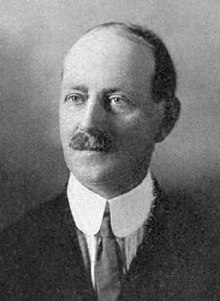Edward Kent, Jr.
| Edward Kent | |
|---|---|
 |
|
| Chief Justice, Arizona Territorial Supreme Court | |
|
In office March 3, 1902 – February 14, 1912 |
|
| Nominated by | Theodore Roosevelt |
| Preceded by | Webster Street |
| Succeeded by | Alfred Franklin (Arizona Supreme Court) |
| Personal details | |
| Born |
August 8, 1862 Lynn, Massachusetts |
| Died | July 30, 1916 (aged 53) Chicago, Illinois |
| Political party | Republican |
| Spouse(s) | Edith Chadwick |
| Profession | Attorney |
Edward Kent, Jr. (August 8, 1862 – July 30, 1916) was an American jurist and the final Chief Justice of the Arizona Territorial Supreme Court. He began his legal career in New York City and worked there for several years before health concerns caused him to move to Denver, Colorado. After serving briefly as an Assistant United States Attorney, Kent was appointed to the Arizona Territorial bench. His most influential decision came in 1910 when he determined the water rights for roughly 5,000 land owners in the Salt River Valley.
Kent was born on August 8, 1862 in Lynn, Massachusetts to Abigail (Rockwood) and Edward Kent. His father was Mayor of Bangor, Maine, then Governor of Maine, and eventually a Justice of the Maine Supreme Judicial Court. His early education occurred at Adams Academy in Quincy, Massachusetts. He then attended Harvard University, from which he received a Bachelor of Arts in 1883, and Columbia University, from which he received a Bachelor of Laws in 1887.
After his admission to the New York bar in 1887, Kent began practicing law in New York City. In 1893, Kent became an associate at the prestigious legal firm of Butler, Stillman & Hubbard. On September 14 the same year he married Edith Chadwick of Baltimore, Maryland. Kent's bride suffered a physical and mental breakdown before the end of the year and needed to be institutionalized for the rest of her life.
...
Wikipedia
